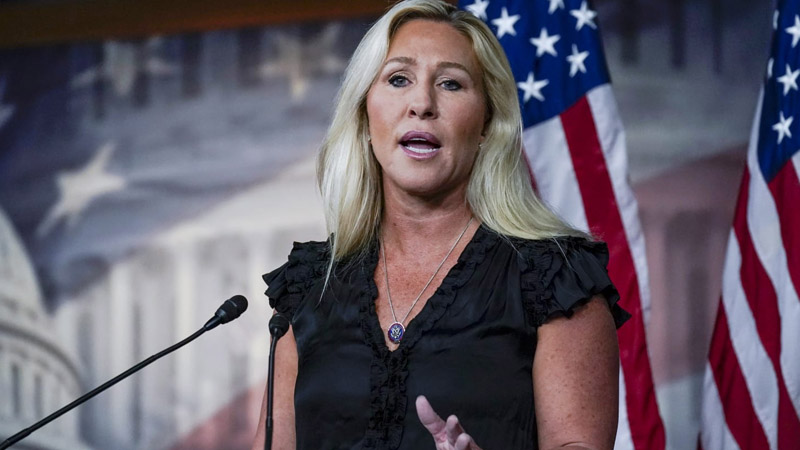Marjorie Taylor Greene Dismisses New York Protesters: “They Hate America”

Carolyn Kaster / AP
Republican Congresswoman Marjorie Taylor Greene took aim at thousands of demonstrators gathered in Manhattan on Saturday to protest Donald Trump’s re-election as president. The event, known as the Protect Our Futures march, brought together various activist groups in opposition to Trump’s return to the White House, a development that has stirred mixed reactions nationwide. Greene, a prominent supporter of Trump, criticized the protestors, suggesting their actions were organized and funded by those with “radical hateful causes.”
According to The Guardian, “thousands of New Yorkers have gathered for the Protect Our Futures march, protesting Donald Trump’s re-election as president.” The demonstration featured labor unions, immigrant rights organizations, and LGBTQ+ advocacy groups. Participants held signs and banners, with one bearing the message “We Won’t Back Down” as they marched outside the Trump International Hotel & Tower at Columbus Circle.
Greene, however, dismissed the demonstrators as politically motivated, implying that they were part of a larger coordinated effort by left-leaning groups. “They are the same organizers of every Democrat protest movement [and] can’t even come up with new chant rhythms,” Greene wrote in a post on Saturday, expressing disdain for what she viewed as an orchestrated display.
Her remarks reflect the contentious divide over Trump’s re-election and the role of protest in American politics. By questioning the authenticity of the protesters, Greene sought to frame the march as part of a recurring pattern she attributes to the Democratic Party. She claimed that these protests were funded by outside interests and alleged that they represented a rejection of American values. “They hate America,” Greene declared, suggesting that their opposition to Trump is, in her view, not rooted in legitimate political differences but in a fundamental opposition to the country.
Greene’s comments underscored her belief that Trump’s re-election reflects the will of “real everyday Americans,” a theme that has been central to her rhetoric. She asserted that the protesters’ causes were “radical and hateful,” positioning herself and her supporters as defenders of a more traditional and patriotic vision of the United States.

The Protect Our Futures march drew participants from various communities who oppose Trump’s policies and fear his second term could lead to further divisive measures. Organizers emphasized issues of workers’ rights, immigrant protections, and LGBTQ+ inclusion, viewing these as essential components of a just society. Their calls to “protect our future” represented a unified stance against policies they perceived as discriminatory and regressive.
Greene, however, dismissed these perspectives, asserting that Trump’s re-election signaled overwhelming popular support. “Trump won the popular vote and election BIGLY! Get over it,” she added in her post. Her comment further amplified her dismissal of the protestors’ concerns, emphasizing her belief in Trump’s mandate and the legitimacy of his victory.
Greene’s remarks illustrate the polarized nature of American political discourse in the wake of Trump’s re-election. For many conservatives like Greene, Trump’s return to the White House is seen as a triumph of American ideals and a rejection of what they perceive as a radical, leftist agenda. Conversely, demonstrators at the Protect Our Futures march represent a coalition of groups who see Trump’s policies as harmful to vulnerable communities and incompatible with their vision for the country.
As Trump prepares to begin his second term, figures like Greene continue to stand as outspoken advocates for his agenda, framing opposition as unpatriotic and disconnected from the needs of “everyday Americans.” In doing so, Greene’s rhetoric highlights the deep ideological divides in the nation, underscoring how figures like her and the protestors occupy fundamentally opposing visions for the future of America.


